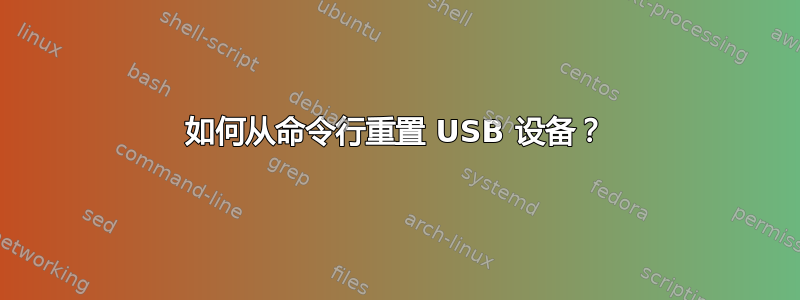
是否可以重置 USB 设备的连接,而无需与 PC 物理断开/连接?
具体来说,我的设备是数码相机。我正在使用gphoto2,但最近收到“设备读取错误”的提示,所以我想尝试通过软件重置连接。
据我所知,没有为相机加载任何内核模块。唯一看起来相关的是usbhid。
答案1
另存为以下内容usbreset.c
/* usbreset -- send a USB port reset to a USB device */
#include <stdio.h>
#include <unistd.h>
#include <fcntl.h>
#include <errno.h>
#include <sys/ioctl.h>
#include <linux/usbdevice_fs.h>
int main(int argc, char **argv)
{
const char *filename;
int fd;
int rc;
if (argc != 2) {
fprintf(stderr, "Usage: usbreset device-filename\n");
return 1;
}
filename = argv[1];
fd = open(filename, O_WRONLY);
if (fd < 0) {
perror("Error opening output file");
return 1;
}
printf("Resetting USB device %s\n", filename);
rc = ioctl(fd, USBDEVFS_RESET, 0);
if (rc < 0) {
perror("Error in ioctl");
return 1;
}
printf("Reset successful\n");
close(fd);
return 0;
}
在终端中运行以下命令:
编译程序:
$ cc usbreset.c -o usbreset获取要重置的 USB 设备的总线和设备 ID:
$ lsusb Bus 002 Device 003: ID 0fe9:9010 DVICO使我们编译的程序可执行:
$ chmod +x usbreset使用 sudo 权限执行该程序;通过运行以下命令对找到的
<Bus>和id 进行必要的替换:<Device>lsusb$ sudo ./usbreset /dev/bus/usb/002/003
答案2
我以前没有遇到过你这种情况,所以我不确定它是否足够有效,但我发现重置 USB 设备的最简单方法是这个命令:(无需外部应用程序)
sudo sh -c "echo 0 > /sys/bus/usb/devices/1-4.6/authorized"
sudo sh -c "echo 1 > /sys/bus/usb/devices/1-4.6/authorized"
这是我用来重置 Kinect 的实际方法,因为 libfreenect 似乎没有用于将其重新置于睡眠状态的 API。它在我的 Gentoo 盒子上,但内核应该足够新,可以使用相同的 sysfs 路径结构。
您的显然不会,1-4.6但您可以从内核日志(dmesg)中提取该设备路径,或者您可以使用类似的方法lsusb来获取供应商和产品 ID,然后使用如下快速命令来列出路径与不同供应商/产品 ID 对的关系:
for X in /sys/bus/usb/devices/*; do
echo "$X"
cat "$X/idVendor" 2>/dev/null
cat "$X/idProduct" 2>/dev/null
echo
done
答案3
这将重置所有 USB1/2/3 连接端口[1]:
for i in /sys/bus/pci/drivers/[uoex]hci_hcd/*:*; do
[ -e "$i" ] || continue
echo "${i##*/}" > "${i%/*}/unbind"
echo "${i##*/}" > "${i%/*}/bind"
done
我相信这会解决您的问题。如果您不想重置所有 USB 端点,您可以使用来自/sys/bus/pci/drivers/ehci_hcd
注:[1]:*hci_hcd内核驱动程序通常控制 USB 端口。ohci_hcd和uhci_hcd分别用于 USB1.1 端口,ehci_hcd分别用于 USB2 端口和xhci_hcd分别用于 USB3 端口。(见https://en.wikipedia.org/wiki/Host_controller_interface_(USB,_Firewire))
答案4
我根据这里的答案创建了一个 Python 脚本,可以简化整个过程。
将以下脚本保存为 reset_usb.py 或者克隆这个仓库。
用法:
python reset_usb.py help # Show this help
sudo python reset_usb.py list # List all USB devices
sudo python reset_usb.py path /dev/bus/usb/XXX/YYY # Reset USB device using path /dev/bus/usb/XXX/YYY
sudo python reset_usb.py search "search terms" # Search for USB device using the search terms within the search string returned by list and reset matching device
sudo python reset_usb.py listpci # List all PCI USB devices
sudo python reset_usb.py pathpci /sys/bus/pci/drivers/.../XXXX:XX:XX.X # Reset PCI USB device using path /sys/bus/pci/drivers/.../XXXX:XX:XX.X
sudo python reset_usb.py searchpci "search terms" # Search for PCI USB device using the search terms within the search string returned by listpci and reset matching device
脚本:
#!/usr/bin/env python
import os
import sys
from subprocess import Popen, PIPE
import fcntl
instructions = '''
Usage: python reset_usb.py help : Show this help
sudo python reset_usb.py list : List all USB devices
sudo python reset_usb.py path /dev/bus/usb/XXX/YYY : Reset USB device using path /dev/bus/usb/XXX/YYY
sudo python reset_usb.py search "search terms" : Search for USB device using the search terms within the search string returned by list and reset matching device
sudo python reset_usb.py listpci : List all PCI USB devices
sudo python reset_usb.py pathpci /sys/bus/pci/drivers/.../XXXX:XX:XX.X : Reset PCI USB device using path
sudo python reset_usb.py searchpci "search terms" : Search for PCI USB device using the search terms within the search string returned by listpci and reset matching device
'''
if len(sys.argv) < 2:
print(instructions)
sys.exit(0)
option = sys.argv[1].lower()
if 'help' in option:
print(instructions)
sys.exit(0)
def create_pci_list():
pci_usb_list = list()
try:
lspci_out = Popen('lspci -Dvmm', shell=True, bufsize=64, stdin=PIPE, stdout=PIPE, close_fds=True).stdout.read().strip().decode('utf-8')
pci_devices = lspci_out.split('%s%s' % (os.linesep, os.linesep))
for pci_device in pci_devices:
device_dict = dict()
categories = pci_device.split(os.linesep)
for category in categories:
key, value = category.split('\t')
device_dict[key[:-1]] = value.strip()
if 'USB' not in device_dict['Class']:
continue
for root, dirs, files in os.walk('/sys/bus/pci/drivers/'):
slot = device_dict['Slot']
if slot in dirs:
device_dict['path'] = os.path.join(root, slot)
break
pci_usb_list.append(device_dict)
except Exception as ex:
print('Failed to list pci devices! Error: %s' % ex)
sys.exit(-1)
return pci_usb_list
def create_usb_list():
device_list = list()
try:
lsusb_out = Popen('lsusb -v', shell=True, bufsize=64, stdin=PIPE, stdout=PIPE, close_fds=True).stdout.read().strip().decode('utf-8')
usb_devices = lsusb_out.split('%s%s' % (os.linesep, os.linesep))
for device_categories in usb_devices:
if not device_categories:
continue
categories = device_categories.split(os.linesep)
device_stuff = categories[0].strip().split()
bus = device_stuff[1]
device = device_stuff[3][:-1]
device_dict = {'bus': bus, 'device': device}
device_info = ' '.join(device_stuff[6:])
device_dict['description'] = device_info
for category in categories:
if not category:
continue
categoryinfo = category.strip().split()
if categoryinfo[0] == 'iManufacturer':
manufacturer_info = ' '.join(categoryinfo[2:])
device_dict['manufacturer'] = manufacturer_info
if categoryinfo[0] == 'iProduct':
device_info = ' '.join(categoryinfo[2:])
device_dict['device'] = device_info
path = '/dev/bus/usb/%s/%s' % (bus, device)
device_dict['path'] = path
device_list.append(device_dict)
except Exception as ex:
print('Failed to list usb devices! Error: %s' % ex)
sys.exit(-1)
return device_list
if 'listpci' in option:
pci_usb_list = create_pci_list()
for device in pci_usb_list:
print('path=%s' % device['path'])
print(' manufacturer=%s' % device['SVendor'])
print(' device=%s' % device['SDevice'])
print(' search string=%s %s' % (device['SVendor'], device['SDevice']))
sys.exit(0)
if 'list' in option:
usb_list = create_usb_list()
for device in usb_list:
print('path=%s' % device['path'])
print(' description=%s' % device['description'])
print(' manufacturer=%s' % device['manufacturer'])
print(' device=%s' % device['device'])
print(' search string=%s %s %s' % (device['description'], device['manufacturer'], device['device']))
sys.exit(0)
if len(sys.argv) < 3:
print(instructions)
sys.exit(0)
option2 = sys.argv[2]
print('Resetting device: %s' % option2)
# echo -n "0000:39:00.0" | tee /sys/bus/pci/drivers/xhci_hcd/unbind;echo -n "0000:39:00.0" | tee /sys/bus/pci/drivers/xhci_hcd/bind
def reset_pci_usb_device(dev_path):
folder, slot = os.path.split(dev_path)
try:
fp = open(os.path.join(folder, 'unbind'), 'wt')
fp.write(slot)
fp.close()
fp = open(os.path.join(folder, 'bind'), 'wt')
fp.write(slot)
fp.close()
print('Successfully reset %s' % dev_path)
sys.exit(0)
except Exception as ex:
print('Failed to reset device! Error: %s' % ex)
sys.exit(-1)
if 'pathpci' in option:
reset_pci_usb_device(option2)
if 'searchpci' in option:
pci_usb_list = create_pci_list()
for device in pci_usb_list:
text = '%s %s' % (device['SVendor'], device['SDevice'])
if option2 in text:
reset_pci_usb_device(device['path'])
print('Failed to find device!')
sys.exit(-1)
def reset_usb_device(dev_path):
USBDEVFS_RESET = 21780
try:
f = open(dev_path, 'w', os.O_WRONLY)
fcntl.ioctl(f, USBDEVFS_RESET, 0)
print('Successfully reset %s' % dev_path)
sys.exit(0)
except Exception as ex:
print('Failed to reset device! Error: %s' % ex)
sys.exit(-1)
if 'path' in option:
reset_usb_device(option2)
if 'search' in option:
usb_list = create_usb_list()
for device in usb_list:
text = '%s %s %s' % (device['description'], device['manufacturer'], device['device'])
if option2 in text:
reset_usb_device(device['path'])
print('Failed to find device!')
sys.exit(-1)


